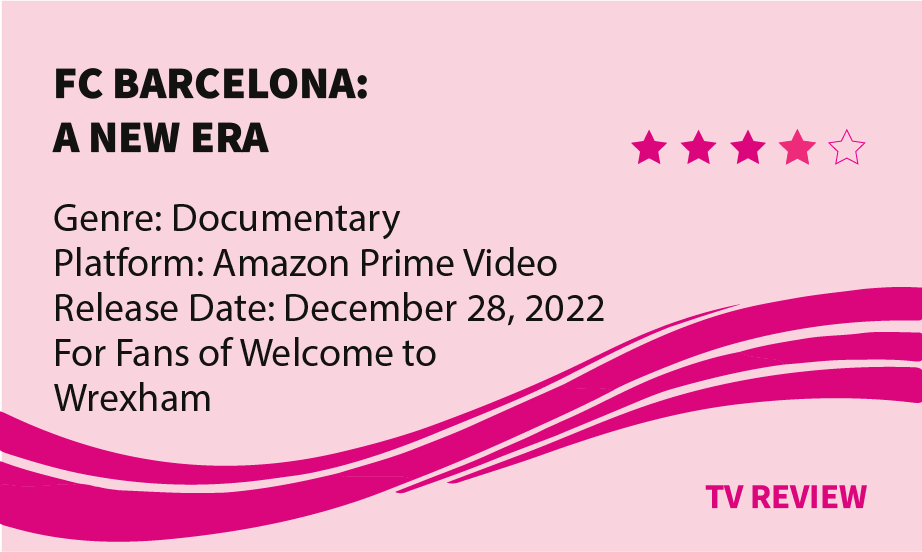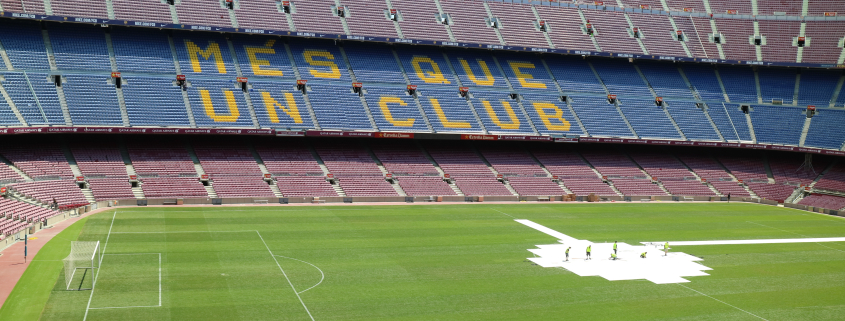‘FC Barcelona: A New Era’ is still living in the past


Fútbol Club Barcelona long held an identity fortified in accolades and driven by soccer icon Lionel Messi. For years, Barça dominated La Liga and brought immense pride to its fanbase. However, just as there was a Barça before Messi, there is now a Barça after Messi. Following his departure, FC Barcelona as a club, or rather dynasty, came crashing down.
Filming began in 2020 and documented club life for two years. On Dec. 28, Amazon Prime released a docuseries. The docuseries, “FC Barcelona: A New Era,” followed the aftermath of his departure, the club’s rebuilding phase and the current status of the team.
Anyone familiar with European soccer knows that the “Messi” name quickly became synonymous with the club itself. While Messi was arguably the beating heart of Barça, this series set out to tell the story of the new generation of players.
Despite the intention to exhibit the future of Barça, the story quickly became overshadowed by the legacy of the past. Messi held the spot as the most notable player on the field for 17 seasons. His name and ability was the foundation the club was built upon. However, the show dwelled far too long on the hole Messi left, which served as nothing more than a hindrance to the portrayal of the current team.
The first two episodes of an only five-episode series follow coaches strategizing on how to re-sign the soccer phenom and the growing anticipation of his final decision. The second episode ultimately culminated in the emotional press conference where Messi announced his departure. By reflecting too much on the history, the series distracted the audience from the athletic prowess of the current team. Every mention of Messi oversaturated the portrayal of the current team with the reputation of the former team. A show which set out to tell the story of the “New Era” of the club should not have gone down the dead-end path of retelling the same story a hundred times. To a certain extent, “FC Barcelona: A New Era” hid the team in the shadows of its past players.
The revolving door of club presidents and coaches, including the arrival of current coach Xavi Hernández, was an alluring dynamic in the show. The intricacies and heavy turnover of Barça leadership portrayed in the first few episodes is the backbone of reconstruction that entices viewers to keep watching. Hernández, a former Barça icon whose role on the field was reimagined to one on the sidelines, helped tides turn in the success of the team and the storytelling of the docuseries.
Despite being a former player, Hernández helped the team pave their own path away from the overbearing legacy of the past. The show’s juxtaposition between the coaches who tried to adopt Barça principles and Hernández who already had these ideals ingrained in him, gave this aspect of the rebuilding process historical depth.
Another strength of the show was including the camaraderie of players and listening to their behind-the-scenes perspectives. As much as the sudden drop in league standings had an effect on the players physically, there was also a significant mental toll. Player interviews throughout the docuseries highlighted the emotional side of soccer, offering a layer of identity to the Barça name. As new players were introduced, viewers saw the identity of the club begin to evolve into a new being — separate from just the impact of Messi.
The only problem was that these new players were introduced far too late in the series. Not until the final two episodes did the door fully close on past players and the spotlight was shown on up-and-coming players such as Pedro González López, or “Pedri,” and Pablo Martín Páez Gavira, or “Gavi.” Gavi and Pedri are a declaration of future Barça success, yet their role on the show was primarily constrained to the final two episodes.
So much of Barça’s journey was lost because the audience was only focused on the end goal: a return to the greatness that once was unstoppable. It was not until the final episodes that acknowledged this elusive former glory can only be recaptured through new puzzle pieces. “FC Barcelona: A New Era’’ makes it clear that Gavi and Pedri are not the first players since Messi to make a positive impact on the field, but they are credited with retrieving the faith in the team that was once so abundant. The biggest mistake of “FC Barcelona: A New Era’’ was framing the new era as “who will fill Messi’s shoes?” when the question all along should have been “who is a part of this new era and what will they accomplish?”

